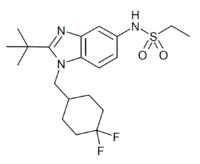Chemistry:AZD-1940
From HandWiki
Short description: Chemical compound
 | |
| Clinical data | |
|---|---|
| Routes of administration | Oral |
| Legal status | |
| Legal status |
|
| Identifiers | |
| |
| CAS Number | |
| PubChem CID | |
| ChemSpider | |
| UNII | |
| Chemical and physical data | |
| Formula | C20H29F2N3O2S |
| Molar mass | 413.53 g·mol−1 |
| 3D model (JSmol) | |
| |
| |
AZD-1940 is a drug developed by AstraZeneca, that is a peripherally selective cannabinoid agonist which binds with high affinity to both the CB1 and CB2 receptors. It was developed for the treatment of neuropathic pain, but while it showed good peripheral selectivity in animal studies,[1] in human clinical trials it failed to show sufficient analgesic efficacy and produced unexpectedly strong side effects associated with central cannabinoid activity, and so was discontinued from further development.[2][3]
See also
References
- ↑ "Radiolabeling of the cannabinoid receptor agonist AZD1940 with carbon-11 and PET microdosing in non-human primate". Nuclear Medicine and Biology 40 (3): 410–4. April 2013. doi:10.1016/j.nucmedbio.2012.10.011. PMID 23352602.
- ↑ "Evaluation of the analgesic efficacy of AZD1940, a novel cannabinoid agonist, on post-operative pain after lower third molar surgical removal". Scandinavian Journal of Pain 4 (1): 17–22. January 2013. doi:10.1016/j.sjpain.2012.08.004. PMID 29913883.
- ↑ "Evaluation of the analgesic efficacy and psychoactive effects of AZD1940, a novel peripherally acting cannabinoid agonist, in human capsaicin-induced pain and hyperalgesia". Clinical and Experimental Pharmacology & Physiology 40 (3): 212–8. March 2013. doi:10.1111/1440-1681.12051. PMID 23324098.
 |

